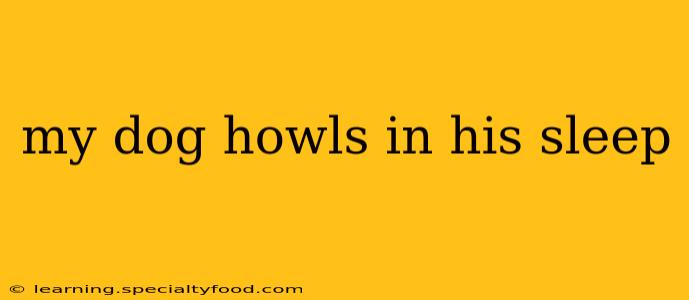Many dog owners have experienced the surprising, sometimes unsettling, sound of their furry friend howling in their sleep. It's a common occurrence, but the reasons behind it can be varied and fascinating. This comprehensive guide delves into the science behind canine dreams, explores the potential causes of sleep howls, and offers advice on how to address this behavior.
Why Do Dogs Howl in Their Sleep?
The most common explanation for a dog howling in their sleep is simply dreaming. Just like humans, dogs experience REM (Rapid Eye Movement) sleep, the stage associated with vivid dreaming. During REM sleep, dogs can exhibit various behaviors, including whimpering, barking, pawing, and yes, even howling. The content of their dreams remains a mystery, but the sounds they make often reflect the emotional intensity of their dream world. Perhaps they're chasing a squirrel, playing with a favorite toy, or reliving a particularly exciting walk.
What Causes My Dog to Howl While Asleep?
While dreaming is the most likely culprit, several other factors could contribute to sleep howling:
1. Discomfort or Pain:
A dog howling in their sleep could be a sign of underlying discomfort or pain. Conditions like arthritis, hip dysplasia, or other injuries can cause a dog to vocalize during sleep due to discomfort. If the howling is accompanied by other symptoms like limping, lethargy, or changes in appetite, a veterinary check-up is crucial.
2. Anxiety or Stress:
Just as humans can experience anxiety dreams, dogs can too. Separation anxiety, fear of loud noises, or other stressful experiences can manifest as howling during sleep. If your dog consistently howls at night or during periods of stress, consider addressing potential anxiety triggers.
3. Neurological Conditions:
In some cases, sleep howling could indicate a neurological condition. While less common, conditions affecting the brain can lead to abnormal vocalizations during sleep. If you suspect a neurological issue, consult your veterinarian immediately.
4. Age-Related Changes:
Senior dogs can experience cognitive decline, similar to dementia in humans. This can lead to confusion, disorientation, and vocalizations, including howling, during sleep.
5. Breed Predisposition:
Some breeds, particularly those known for their vocal nature, might be more prone to sleep howling than others. This is likely due to genetic factors influencing their vocalization tendencies.
Is My Dog’s Sleep Howling Normal?
For most dogs, occasional sleep howls are perfectly normal and nothing to worry about. However, persistent or excessively loud howling could be a sign of a problem. If your dog's sleep howling is accompanied by other changes in behavior, frequency, or intensity, it's essential to consult your veterinarian to rule out any underlying medical or behavioral issues.
How Can I Help My Dog Stop Howling in His Sleep?
Addressing sleep howling depends on its underlying cause. If it's related to discomfort, treating the underlying condition is crucial. For anxiety, techniques like desensitization, counter-conditioning, and calming aids can be helpful. A veterinarian or certified professional dog trainer can offer tailored advice and support. In some cases, creating a calm and comfortable sleep environment, ensuring adequate exercise, and sticking to a regular routine can also make a difference.
My Dog Howls in His Sleep – When Should I See a Vet?
You should consult your veterinarian if:
- The howling is frequent and intense.
- It's accompanied by other concerning symptoms like limping, lethargy, or changes in appetite.
- The howling starts suddenly after a period of normal sleep.
- Your dog seems distressed or uncomfortable even when awake.
Remember, understanding your dog's behavior is key to ensuring their well-being. By carefully observing your dog and seeking professional help when needed, you can address any underlying issues and help them enjoy peaceful and restful sleep.
